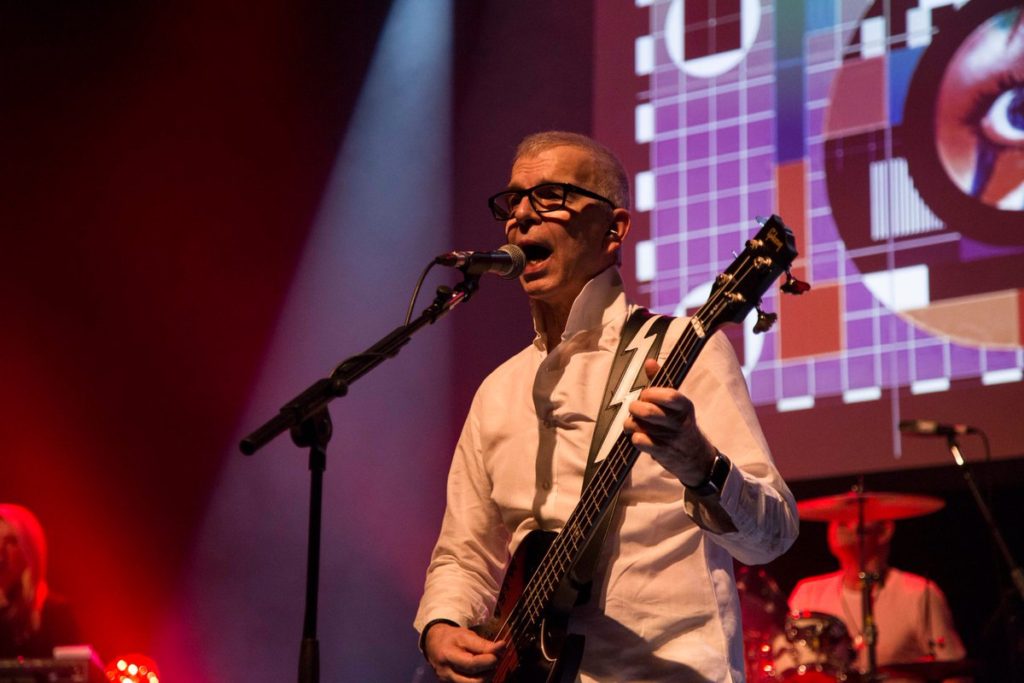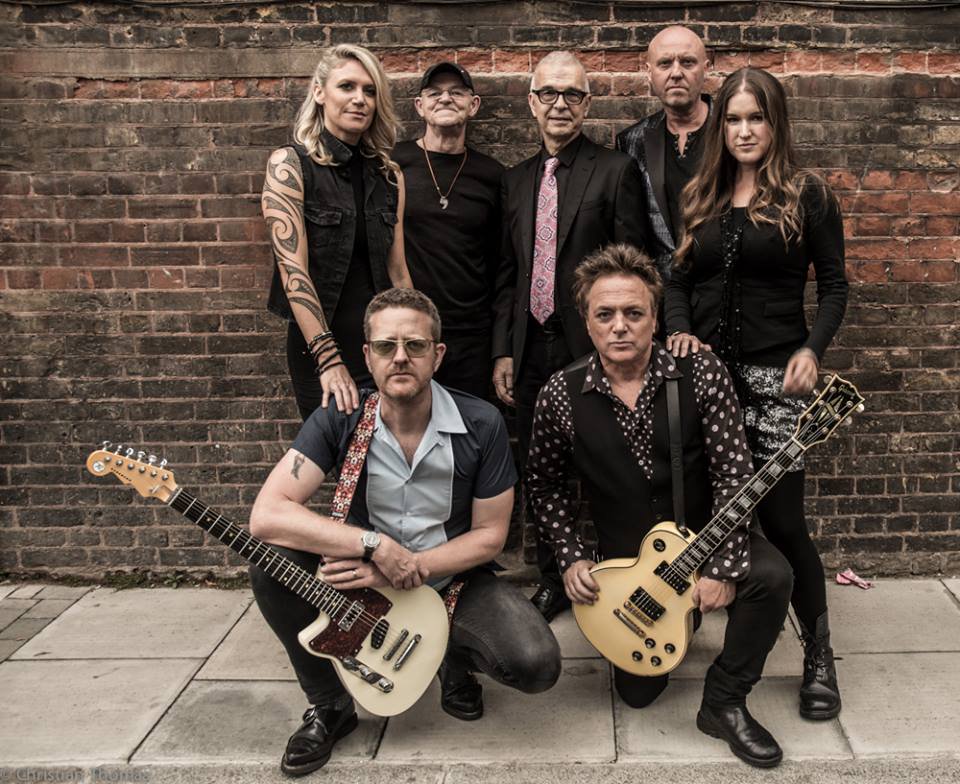Tony Visconti, one of the greatest producers of all time and long time collaborator with David Bowie, is embarking on another UK tour with Holy Holy to celebrate David’s music. Jason Barnard speaks to Tony about David, the Holy Holy group and his imminent tour.
You are about to embark on another UK tour with Holy Holy next month. As you’ll be playing ‘Ziggy Stardust’ in its entirety this time, will this be more of a challenge for you as a bassist? Are there many songs you haven’t played before with the band?
I have played the entire Ziggy Stardust album before with Holy Holy, it was the feature of our last tour. I find it a less challenging album than The Man Who Sold The World, which was essentially a difficult Prog Rock album to memorise and play. Ziggy songs are 3 minute Pop songs, a lot easier to play. I have to say that walking in Trevor Bolder’s footsteps is difficult because he made his parts very personal. He was a great bassist. I follow his parts but modified to my style of playing.
I saw Holy Holy live in Leeds a few years ago. It was clear that Glenn Gregory was one of the few singers who carry this role off. How did you get the idea for Glenn to sing?
I worked with Glenn on another project written by a Dutch composer Stephen Emmer. It was Sinatra type stuff and I fell in love with his voice. He was also a very charming man. I put his name forward mainly because I didn’t want a skinny singer with his hair dyed orange. That would’ve been disrespectful in some way, the obvious thing to do. David Bowie was still alive when we formed this band and he liked what he heard.
I’ve heard that you played David some of the Holy Holy versions of The Man Who Sold The World. What was his view on you playing his material live with Woody and the Holy Holy versions of his songs?
He was very impressed. He regretted not touring for the album back in the day. His manager told him to sack us, he didn’t need a band. He said, “If we stayed together we’d have been as good as that.”
Is there anything you’ve learnt, or thought about David’s material, that you wouldn’t have known otherwise?
I’ve noticed he has a few favourite chord sequences that pop up in lots of his songs from that period, like F – Ab – Bb – C in The Supermen and Saviour Machine and others. Not that I wasn’t aware of how beautiful his melodies were, I am reminded constantly every time Glenn sings them on stage!
When did you first meet David? Was it through Marc Bolan as you produced the Tyrannosaurus Rex albums?
I first met David through his publisher, David Platz of Essex Music. They were at a wits end with him, couldn’t put him in a box. After I had worked with Marc Bolan for the same publisher he said, “You seem to work well with weird acts, maybe you can do something with David Bowie?” I met David minutes afterwards and we spent the rest of the day together, ended it with seeing A Knife In The Water (Pulanski) in a cinema in Chelsea.
David Bowie’s former guitarist John ‘Hutch’ Hutchinson described to me how David’s early work was different to other music being released at the time. Was this something apparent to you by the time you produced him?
Yes, I was only attracted to artistes who were unique and saying something different or differently. Marc and David were perfect! My desire to work with both of them was overwhelming. I had to fight to get them into the studio because they were considered to be not commercial. So how many millions of records did they sell in the end? Like a BILLION!
I’ve previously spoken to Ken Scott who engineered the Space Oddity and Man Who Sold The World albums for you. He said “Obviously he had a certain amount of talent but, from those two projects, I didn’t think he would ever be anything, really.” What was your view of David’s potential in that period?
Ken Scott worked partially on both those albums. He never sought to work with David, he was a house engineer who came with the studio that I booked. Roy Thomas Baker was another engineer who worked at Trident. I also recorded David at Advision Studios with Eddie Offord. I, of course, saw in David an artiste who would one day rival The Beatles. Gus Dudgeon was also a champion of David’s seeing Space Oddity as a huge hit.
Do you think that given Mick Ronson and Woody’s arrival into the band pushed David into a harder less folky sound, or was this something David was seeking any way?
After the Space Oddity album both David and I both wanted the next album to be Hard Rock. Mick was the blessing we needed. We asked him to join after playing a couple of songs with us.
The Man Who Sold The World album seems unique in David’s catalogue in that the songs were written and developed collaboratively by the band. Are there any particular tracks that you felt were the most collaboratively worked on? Can you describe how the song/s developed?
They were mostly collaborative. David was still writing on his 12-string and it was our job to make them rock harder. Mick and I wrote our own parts. After All is perhaps the only through back song to the Space Oddity period. I adore that song. I played three bass parts. She Shook Me Cold was certainly a group effort, as well as part two of The Width of A Circle. By today’s standards the entire band should’ve have got writing credits.
Woody said to me that the Man Who Sold The World album was like ‘Bowie’s Sgt Pepper, everything but the kitchen sink’. Were there any production techniques or instruments that you used for the first time on that LP?
It was a live album, we played loud and live, very loud. It was a new way of recording for me. I had loads of ideas I could only do if I had the time, and I did on this album. I was never afforded more than a couple of weeks to make an album but we had a better budget. Mainly I was able to create complex textures with lots of overdubbing and special effects. Also, David, Mick and I had voices that complimented each other and we had a particularly nice bunch of backing vocals on that album. The Supermen sounds like Queen (before they were formed).
How did working with David evolve over the years? Was David’s vision for musical projects more defined by the time of Diamond Dogs onwards? How does it compare to the production and David’s vision for Blackstar?
David’s production values grew stronger over the years coming to a very professional level with DD. He was really great on the arranging side but never bothered too much with the technical side. He didn’t want to be bothered with EQ and Compression, etc . He started to produce others and got even sharper that way. By the time I made his last four albums he rightly deserved the credit as co-producer. Many times I would be the musician or backing singer and he would be guiding me as I would guide him. Making his last four albums has been a fantastic experience.
What’s the favourite track that you worked with David on and why?
That changes all the time. I love Scary Monsters, Heroes, After All…I can’t nail it down to just one.
You have assembled a great band including Lisa Ronson and your daughter Jessica Lee Morgan on backing vocals, making it a family affair. Having such a strong bond in the group seems to add to emotion of the concerts. Do you find that playing Holy Holy shows since David has passed away cathartic? Does it help you connect with him now that he’s not physically here?
Every Holy Holy show is emotional and cathartic for me. Lisa is no longer in our band, she left to pursue a solo career, but my daughter Jess does an amazing job. She was an infant present at the recording of Low. She grew up listening to rough mixes of my Bowie albums. She fits us like a glove – and sings a killer version of Lady Stardust.
Thank you for sharing your memories Tony. I wish you all the best on another successful Holy Holy tour.
My pleasure. Thank you for asking.
The final tickets for Woodmansey and Tony Visconti’s Holy Holy February 2019 UK tour can be found at holyholy.co.uk



